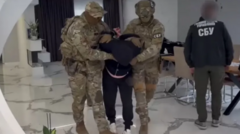Chinese President Xi Jinping demonstrated a distinctive rapport with Russian President Vladimir Putin during the Moscow Victory Day parade, revealing an intricate balance in their relationship that merges cooperation with caution.
Xi Walks a Fine Line Between Friendship and Diplomacy with Putin

Xi Walks a Fine Line Between Friendship and Diplomacy with Putin
Analyzing Xi Jinping's Strategic Positioning at the Moscow Victory Day Parade
During Moscow's recent Victory Day parade, Chinese President Xi Jinping positioned himself prominently alongside Russian President Vladimir Putin, solidifying their public image of camaraderie. As their troops marched in unison, Xi declared their relationship "unbreakable," calling for Russia and China to be "friends of steel." This marks Xi's 11th trip to Russia since assuming the presidency in 2013, and the two leaders have met over 40 times. Putin is expected to visit China this fall, underscoring their ongoing diplomatic ties, which have included rare public gestures of affection.
However, beyond their displays of unity, experts like Mathieu Boulegue from the Center for European Policy Analysis caution that the alliance is complex and fraught with competition and performance. While visible signs of cooperation abound, the dynamics reveal a partnership that is far from equal. Xi's challenges are amplified by Putin's controversial actions, such as the Ukraine invasion, which has isolated Russia internationally, compelling China to navigate its alliances carefully to avoid alienating potential partners, especially in Europe.
China's diplomatic outreach has recently gained traction, illustrated by communications between Xi, European Commission President Ursula von der Leyen, and European Council President António Costa, commemorating 50 years of bilateral relations. The dilemma persists, however, as China's support for Russia, particularly through economic means, strains its relationship with the West.
Xi aims to convey a message not just to Europe, but also to the United States. In light of former President Donald Trump's overtures toward Moscow, Xi's statement on maintaining strong bonds with Russia signals a determination to resist Western attempts to create divisions between Beijing and Moscow. Together, they voiced concerns over U.S. military initiatives, framing them as threats to global stability and effectively challenging American dominance.
Amid these geopolitical maneuvers, it's essential to recognize that while China has emerged as a global power, Russia's influence has waned significantly due to economic sanctions and military setbacks stemming from the ongoing conflict in Ukraine. Experts note that Russia's dependence on China is growing, suggesting the balance of power in their relationship is tipping.
As Xi and Putin exchange smiles, handshakes, and occasional hugs at public events, underlying tensions and potential conflicts may arise in the future as both leaders navigate the intricacies of their relationship amid shifting global dynamics.





















